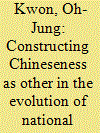| Srl | Item |
| 1 |
ID:
179527


|
|
|
|
|
| Summary/Abstract |
This study traces the way the evolving nature of the Korean national identity has shaped the construction of the Chineseness of immigrants as others. Two immigrant groups, Chinese immigrants called Hwagyo and Korean-Chinese referred to as Joseonjok, have constituted the majority of foreigners in Korea during different historical eras. Although Koreans assumed both represented ‘Chinese’ people, I argue that the core of their Chineseness was defined differently according to the evolving sense of the Korean subjectivity. The growth of the national economy and the culturally advanced and orderly society constituted the sources of the national character and provided legitimate grounds to discriminate against Chinese immigrants who were assumed to pose economic and cultural threats. This study suggests that the different logic of ‘othering’ is derived from the evolution of the Korean national identity in response to the nation’s changing economic and political circumstances.
|
|
|
|
|
|
|
|
|
|
|
|
|
|
|
|
| 2 |
ID:
161046


|
|
|
|
|
| Summary/Abstract |
This article is a study of the evolution of the Ukrainian national and political identity in the context of the most important aspects of its formation, singled out by the author. The author’s methods are based on the principle of historicism. He analyzes the formation and development of political practices and the political regime in Ukraine in the 20th-21st centuries, and compares peculiarities of the ethnic, cultural and political development of Ukraine with that of Russia and other countries in Eastern Europe. Prospects for the development of the political situation in Ukraine are discussed through the prism of the geopolitical paradigm. The author points out that during the Soviet period there were factors that worked for the separation of Ukrainians from Russians and those that worked against it. In the post-Soviet period, under the influence of growing ethnic and civic nationalism, globalism and some peculiarities of Ukrainian political culture separatist tendencies prevailed. The current conflict in Donbass has entered into a smoldering phase, which is most advantageous to the Ukrainian authorities. He describes as unlikely the possibility of major changes in the Ukrainian regime. The more probable scenario, in his opinion, is inertial.
|
|
|
|
|
|
|
|
|
|
|
|
|
|
|
|